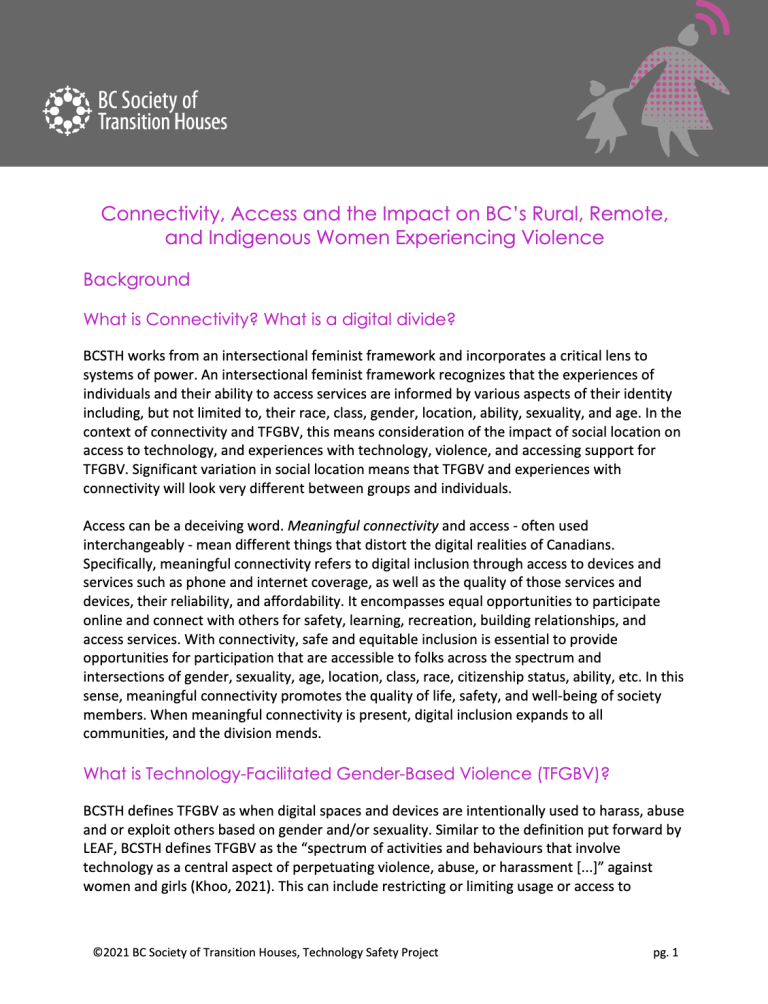16 search results
For the private sector, phone and internet providers
Women and Girls in Rural, Remote, and Indigenous (RRI) communities face added barriers to meaningful connectivity due to their rurality.
Recommendation 1: Affordable internet and phone programs can build on their work by undergoing a review of their accessibility that applies a barriers reduction approach in order to maximize their impact. Simultaneous work could be conducted related to program equity. (This could include, for example, exploration of innovative policies such as sliding scale payments.)-
Category and theme:
Audience:
For the private sector, phone and internet providers
Women and Girls in Rural, Remote, and Indigenous (RRI) communities face added barriers to meaningful connectivity due to their rurality.
Recommendation 2: Help invest in connectivity infrastructure (ex. cell phone towers, internet wiring, etc) to expand availability of affordable access plans where they are most needed.-
Category and theme:
Audience:
For the private sector, phone and internet providers
Women and Girls in Rural, Remote, and Indigenous (RRI) communities face added barriers to meaningful connectivity due to their rurality.
Recommendation 3: Increase speeds offered in affordable access programs to meet targets in order to help facilitate equitable and meaningful connectivity for all.-
Category and theme:
Audience:
For government, RRI communities, private sector, phone and internet providers
Women and Girls in Rural, Remote, and Indigenous (RRI) communities face added barriers to meaningful connectivity due to their rurality.
Recommendation 4: ISPs could consider partnering with RRIs communities to develop alternatives so that communities have increased choices. This could work in conjunction with increased affordable internet and phone plans, as well as related equity and accessibility reviews (Organizations such as Pathways to Technology and The First Nations Technology Council are working in this field).-
Category and theme:
Audience:
For NGOs, BCSTH, government, private sector, phone and internet providers
Women and Girls in Rural, Remote, and Indigenous (RRI) communities face added barriers to meaningful connectivity due to their rurality.
Recommendation 5: Research whether additional “light” or “lightweight” versions of websites can be developed in order to decrease demand on the internet for individuals trying to access these sites ( CBC news recently launched “CBC Lite” to make news more accessible to rural and remote Canadians. https://www.cbc.ca/news/canada/montreal/introducingcbc-lite-1.5943819)-
Category and theme:
For government
Women and Girls in Rural, Remote, and Indigenous (RRI) communities face added barriers to meaningful connectivity due to their rurality.
Recommendation 6: Revise policies relating to connectivity and expansion goals in order to recognize gender-based and intersectional elements of digital divides, as well as how these relate to violence and anti-violence work. Shift work related to connectivity from a conversation that focuses mainly on economic inclusion and opportunities to one where gender equality and safety is also central.-
Category and theme:
For BCSTH, government, advocacy organizations and NGOs
Lack of meaningful connectivity negatively impacts both service providers and service users.
Recommendation 7: Support meaningful connectivity for anti-violence workers of all abilities and make online training more accessible by providing closed captions on online webinars.-
Category and theme:
Audience:
For BCSTH, government, advocacy organizations and NGOs
Lack of meaningful connectivity negatively impacts both service providers and service users.
Recommendation 8: For online training or webinars, accommodate varying levels of connectivity by providing text copies of slides (in the description, caption, etc.) in case audio cuts out for anti-violence workers tuning in from RRI communities. Provide copies of slides before the training session so that participants can attend in listen only mode.-
Category and theme:
Audience:
For BCSTH, antiviolence organizations/member programs
Lack of meaningful connectivity negatively impacts both service providers and service users.
Recommendation 9: Develop and provide more comprehensive digital literacy training for RRI anti-violence workers.-
Category and theme:
Audience:
For BCSTH, antiviolence organizations/member programs
Lack of meaningful connectivity negatively impacts both service providers and service users.
Recommendation 10: Provide spaces for anti-violence workers and organizations in RRI communities to collaborate, interact, and share their experiences in the spirit of mutual support and solidarity; support the implementation of communities of practice for rural membership such as the Safehomes Community of Practice for rural members that BCSTH is organizing. One anti-violence worker voiced that the development of this kind of interaction would be helpful to countering at times urban centric policies and systems.-
Category and theme:
Audience:
